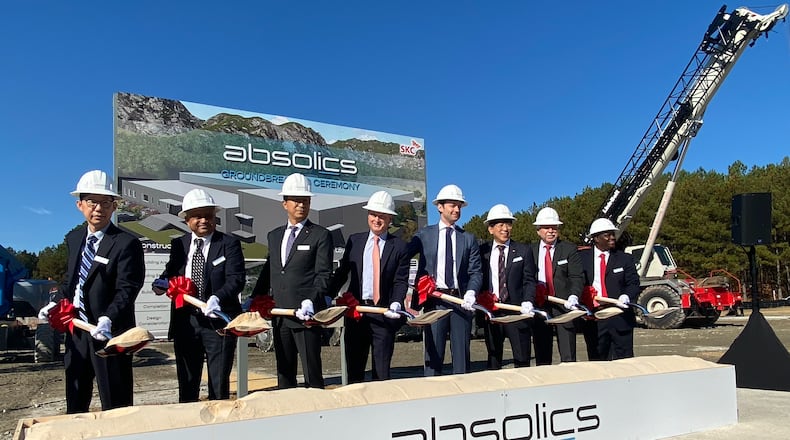A South Korean company with technology developed in partnership with Georgia Tech broke ground Tuesday on a giant new semiconductor materials factory east of Atlanta, signaling Georgia’s first foray into computer chip manufacturing.
Absolics, a subsidiary of Korean conglomerate SK Group, touts its glass substrate material as a breakthrough in computer chip technology. The Covington plant is expected to employ 410 workers and represent a $600 million investment, both increases from figures touted last year when the projected was announced.
The new factory will make materials to package chips together, not finished semiconductors, which for now will be assembled in Asia. But state and company officials say the new technology could eventually lead to full semiconductor production in the Peach State.
Georgia has enjoyed a long economic partnership with South Korea. Another subsidiary of SK Group, SKC, was the first South Korean company to open a factory in Georgia in 1996 with a polyester film plant on the site of the future Absolics factory.
“This circle of relationships truly has paid off over a number of years,” said Pat Wilson, commissioner of the Georgia Department of Economic Development.
Since that first Korean factory, Georgia has landed a Kia Motors factory in West Point, an SK electric-vehicle battery plant near Commerce and just last week, Hyundai Motor Group held a groundbreaking ceremony for a $5.5 billion EV factory near Savannah — Georgia’s largest ever jobs deal.
Semiconductor manufacturing is a massive industry that provides critical technology for everything from mobile phones to medical equipment to automobiles.
Computer chip manufacturing is concentrated in Asia, and the COVID-19 pandemic caused a global shortage which rippled through the global economy. Over the summer, federal lawmakers adopted the CHIPS and Science Act, which aimed to boost domestic semiconductor production.
“The legislation we passed earlier this year was aimed precisely at helping to build out our domestic semiconductor value chain,” U.S. Sen. Jon Ossoff said at the groundbreaking, adding it will continue to strengthen South Korea’s investment in Georgia.
Absolics’ Covington facility will make glass-based substrates, which attach chips to circuit boards. The glass technology was developed in part by former Georgia Tech electrical engineering professor Sung Jin Kim, who now works for SK Group. The company said using glass rather than plastic, the current industry standard, allows more chips to be packaged on a single device while using less energy.
Credit: Zachary Hansen
Credit: Zachary Hansen
The factory will only make the substrates, so they’ll have to travel back to Asia for final assembly before potentially returning to the U.S. as finished semiconductors to be inserted in products of all sorts. Gary Park, Absolics chief operating officer, said more chip manufacturing operations could move to the U.S. with time.
“We don’t want to move all the glass (substrates) to Asia and come back here again,” Park said. “So we believe that once our technology is proven, I think our customers will move to the U.S. That is our target, and I think that is very feasible.”
The state Department of Economic Development did not disclose incentives offered Absolics to build in Georgia. A spokeswoman said the Absolics recruitment “remains an active project” and inducements offered will be disclosed once an agreement has been signed.
Operations are expected to start in mid-2024.
About the Author
Keep Reading
The Latest
Featured



